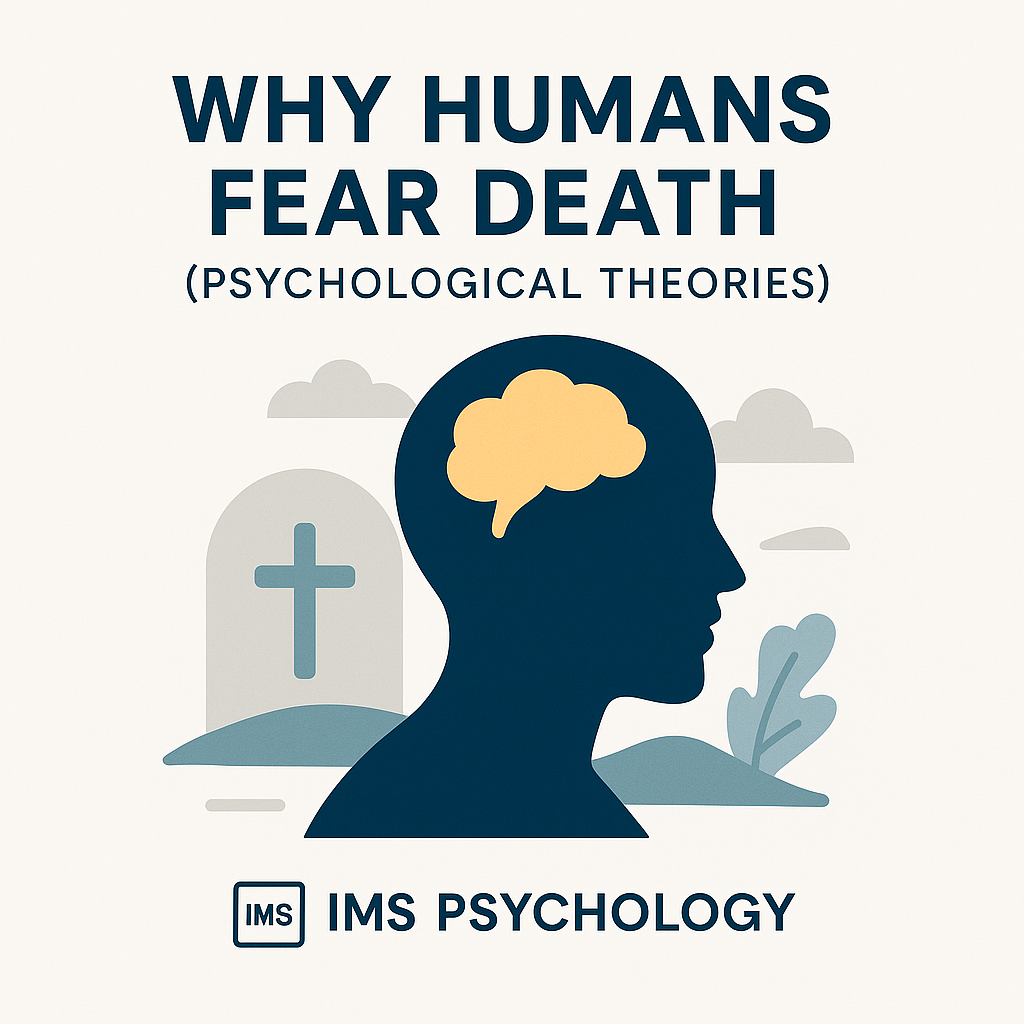
Why Humans Fear Death (Psychological Theories)
Share
Why Humans Fear Death (Psychological Theories)
Explore the psychology behind our fear of death. Learn how theories from existential psychology, neuroscience, and developmental science explain this universal fear.
Introduction: The Fear We All Share
Death is one of the few experiences that touches every human life — yet it remains one of the least talked about. Whether it surfaces in the background of daily life or erupts in moments of crisis, the fear of death is a core part of the human experience.
Why do we fear death? Is it the pain, the unknown, the loss of self, or something deeper? Psychology offers several perspectives — from existential philosophy to cognitive science — that help us understand this fear and how to live alongside it.
1. Terror Management Theory (TMT): The Fear Beneath the Surface
Terror Management Theory, developed by psychologists Greenberg, Solomon, and Pyszczynski, argues that much of human behavior is motivated by the unconscious fear of death.
Key Concepts:
-
Humans are unique in knowing they will die.
-
This awareness creates existential terror.
-
To manage this fear, we cling to:
-
Cultural worldviews (e.g., religion, nationalism, social identity).
-
Self-esteem (as proof of value and legacy).
-
-
These systems give us a sense of meaning and permanence, buffering the fear of mortality.
Examples in Daily Life:
-
Defending beliefs more aggressively when reminded of death.
-
Seeking symbolic immortality through legacy, fame, or children.
-
Anxiously avoiding aging or illness.
2. Freud’s Theory: Repression and the Death Drive
Freud proposed that we don’t actually fear death consciously — because the unconscious mind can’t grasp the concept of non-existence.
He introduced:
-
The Death Drive (Thanatos): An instinct toward self-destruction or return to an inorganic state.
-
Death anxiety, he believed, is displaced onto smaller fears (e.g., illness, loss, danger).
While debated, Freud’s ideas paved the way for psychodynamic views of mortality, seeing fear of death as something symbolic and disguised.
3. Existential Psychology: Meaning in the Face of Death
Psychologists like Viktor Frankl, Irvin Yalom, and Rollo May viewed death not as pathology — but as a mirror for life.
Key Principles:
-
Death awareness can lead to anxiety — but also awakening.
-
Avoidance leads to numbness or over-control.
-
Acceptance allows for deeper meaning, presence, and intentional living.
As Frankl wrote in Man’s Search for Meaning:
“What matters is not the meaning of life in general, but the specific meaning of a person’s life at a given moment.”
Facing death helps us:
-
Clarify values.
-
Let go of trivial pursuits.
-
Cultivate gratitude and presence.
4. Developmental Psychology: When Do We Learn to Fear Death?
Children don't fear death the way adults do — because their concept of it evolves over time.
Developmental Milestones:
-
Ages 3–5: View death as reversible or temporary.
-
Ages 6–9: Begin to understand death as permanent but not universal.
-
Ages 10+: Grasp the inevitability and universality of death.
As abstract thinking develops in adolescence and adulthood, death awareness deepens, often triggering new layers of questioning — about purpose, faith, and the self.
5. Cognitive Psychology: The Unknown and Loss of Control
From a cognitive lens, fear of death arises from:
-
Ambiguity: We don’t know what comes after.
-
Loss of control: Death is one event we cannot stop.
-
Loss of self: Consciousness as we know it disappears.
This can lead to:
-
Anxiety sensitivity (worrying about bodily symptoms).
-
Catastrophic thinking (imagining worst-case scenarios).
-
Control-seeking behaviors (rituals, health obsessions, etc.).
6. Neuroscience and Death Anxiety
Neuroscience research shows that:
-
The amygdala (fear center) activates in response to death-related stimuli.
-
But when reminded explicitly of death, people often mentally “tune out” — suggesting built-in avoidance mechanisms.
Default Mode Network (DMN):
-
The DMN, active during mind-wandering and self-reflection, is heavily tied to ruminations about mortality and the self.
-
Mindfulness practices help deactivate DMN overactivity, offering psychological relief.
7. Cultural and Spiritual Frameworks
Cultural upbringing shapes whether death is viewed with:
-
Fear and finality (e.g., Western materialist views).
-
Reverence and continuity (e.g., Indigenous or Eastern perspectives).
Beliefs about afterlife, karma, or soul continuation can soften fear by framing death as a transition, not an end.
However, even in religious individuals, fear of dying (pain, separation, regret) often remains distinct from fear of being dead.
Why Understanding Death Helps Us Live Better
Rather than being morbid, engaging with mortality can be transformational.
It can lead to:
-
More present-moment awareness.
-
Stronger boundaries and values.
-
Deeper emotional connection with others.
-
Less fear of change, impermanence, and aging.
Conclusion: Fear of Death Is Fear of Not Living Fully
At its core, the fear of death is often a reflection of unlived life — the dreams we haven’t pursued, the words we haven’t spoken, the love we haven’t allowed ourselves to feel.
Understanding this fear — rather than avoiding it — opens the door to meaningful living, emotional growth, and authentic connection.
written by,
Martin Rekowski (29.09.2025)
-
External link suggestion: APA – Coping With Death and Grief https://www.apa.org/topics/grief